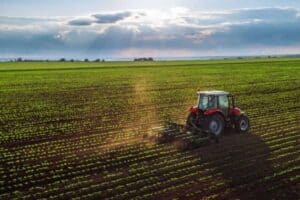'Farmers relying on irrigation would be grateful for some rain because if they lose an irrigation cycle, they lose a lot.'

Farmers were in dire need of some rain to save the crops damaged by the extreme heat and load shedding. Transvaalse Landbou-Unie (TLU) SA general manager Bennie van Zyl said farmers needed rain urgently.
“In the highveld, if they don’t get rain soon, there will be devastating damages to crops.”
Van Zyl said the maize crops were now in the phase it needed rain the most.
Massive loss
“Farmers relying on irrigation would be grateful for some rain because if they lose an irrigation cycle, they lose a lot,” he said.
Van Zyl said the heat increased the water demand.
“If a potato farmer spends about R250 000 per hectare, it is R1 million on four hectares. If the farmer can’t harvest, it’s a massive loss,” he explained.
Van Zyl said farmers in the Northern Cape were struggling to get through the season with maize dying under too little irrigation. Free State cattle farmer Tewie Wessels said conditions were very dry.
ALSO READ: Water crisis: Increased usage due to heatwave and vandalised infrastructure
“And it doesn’t look like rain is on the way anytime soon,” he said.
Wessels said should it not rain soon, the damage could be costly.
“We need rain in the next two weeks,” he said.
Heatwave requires irrigation
Agricultural Business Chamber of South Africa chief economist Wandile Sihlobo said apart from the ongoing concerns about the energy crisis, agricultural conditions in the country were generally favourable.
“Even though we experienced severe heat, the improved soil moisture from the heavy rains in the sector have kept crops in good condition,” he said.
Sihlobo said there was uncertainty due to the large-scale nature of areas that depended on irrigation and some that relied on efficient ports and processing facilities due to load shedding.
“The interventions to be made by government and private sector to the energy crisis will be a key determinant of the sector’s performance for 2023,” he said.
Sihlobo said factors beyond our control, such as the weather, have been positive for the first part of the year. Still, the heatwave requires irrigation in various areas to sustain the crops and orchards in good condition.
ALSO READ: Heatwave warning: Take precautions, as temperatures could reach 40°C
Vox Weather meteorologist Annette Botha said a dominating high pressure, over the Northern Cape, in the upper levels of the atmosphere was responsible for the extreme heat and dry conditions.
“When a high pressure sits over an area, it results in the sinking of air through the atmosphere. The air compresses and heats up as it sinks. Sometimes, the scorching heat is ensnared in what is called a heat dome,” she said.
Botha said the high-pressure circulation in the atmosphere acts like a dome or cap, trapping heat at the surface and favouring the formation of a heatwave.
“This significantly decreases the chances of convection taking place for thunderstorms to develop,” she said.
Botha warned prolonged exposure to midday sun poses health risks, such as dehydration and heatstroke. She said Gauteng and the interior parts were expected to remain dry and warm and only forecast to cool down later this week when a cold front reaches the Western Cape to bring cooler weather and isolated showers to the southwest.
Farmworkers die from heatstroke
Meanwhile, Employment and Labour Minister Thulas Nxesi has called for an investigation into the deaths of farmworkers due to heatstroke.
Seven people in Kakamas, Northern Cape, died due to heatstroke last week. The seven farmworkers were admitted to the Kakamas Hospital at about the same time, Dr George Pasquin told the SABC.
The Northern Cape health department confirmed the five died last Thursday, and two on Friday morning. Another farmworker remains on a ventilator at the hospital.
– [email protected] – Additional reporting by Asanda Mbayimbayi






